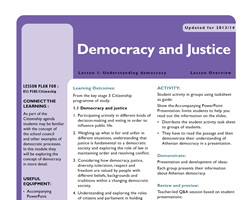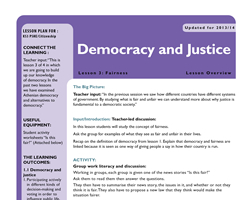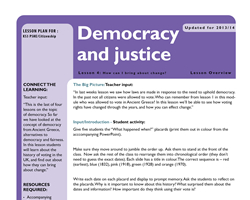Citizenship Lesson Plans / KS3 - Democracy - 4 lessons
KS3 - Democracy - 4 lessons
4 lessons on the topic of democracy - the history of democracy, alternatives to democracy, and how they can take part.
With the vote only a few years away, it is essential that young people understand that they play an important role in the democratic process.
These citizenship lesson plans include teacher notes, student worksheets and group activities.

What exactly is a "oligarchy"? Is an autocracy a bad thing? This lesson introduces students to alternatives to democratic systems.
-
 TRS Citizenship Democracy Lesson 2 PDF
TRS Citizenship Democracy Lesson 2 PDF
-
 TRS Citizenship Democracy Lesson 2 PPT
TRS Citizenship Democracy Lesson 2 PPT
-
 TRS Citizenship Democracy Lesson 4 PDF
TRS Citizenship Democracy Lesson 4 PDF
-
 TRS Citizenship Democracy Lesson 4 PPT
TRS Citizenship Democracy Lesson 4 PPT
More about the Democracy Activities for Citizenship
In just a few years, your students will be eligible to take part in the government voting process, but what do they understand about democracy? In this series of 4 citizenship lessons, we start with the history of democracy and finish by looking at ways to use the democratic system to bring about change.
Lesson 1 – Understanding Democracy
In this teacher led exercise, we first establish understanding of the word democracy. This is followed by an activity which explores the history of democracy.
Lesson 2 – Alternatives to Democracy
We now take a look at other types of rule including monarchy, autocracy and anarchy amongst others. Students are required to research each type of rule and present their findings to the class.
Lesson 3 – Fairness
In this lesson, students will study the concept of fairness. In a series of group work activities and teacher led discussions, they consider the fairness of outcomes of specified case studies. Could new laws make these issues fairer?
Lesson 4 – How Can I Bring About Change?
Now that we have an understanding of the democratic process, we turn our attention to their own involvement in the UK democracy. Discussions and activities cover how does it work, how old do they need to be to vote etc.
Vocational Qualifications
These democracy lessons can be used to support learning outcomes for Key Skills and Workplace Core Skills - Individual Rights and Responsibilities, Personal Development and Contributing to the Community from City & Guilds. These lessons are also suitable for use with Skills Towards Enabling Progression "Step Up" - Rights and Responsibilities from NOCN; Citizenship Studies - Identity, Democracy and Justice from OCR.




